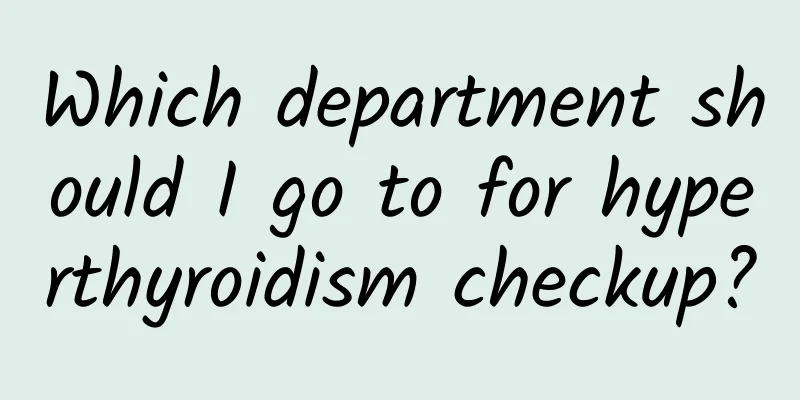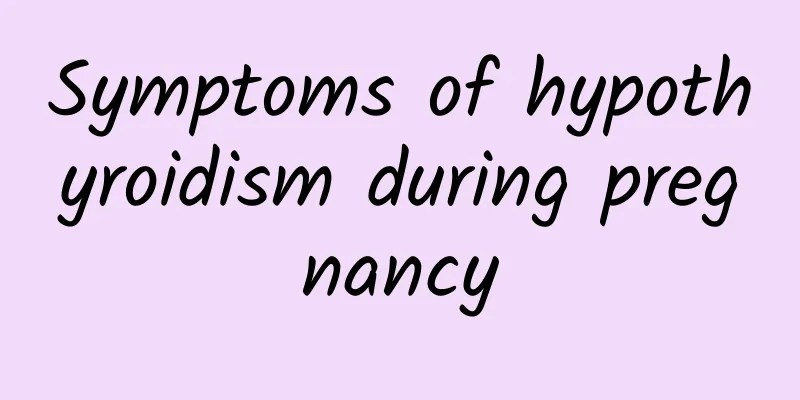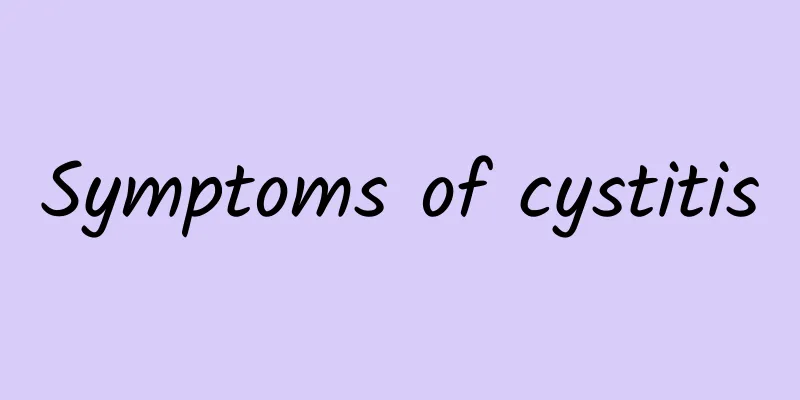Which department should I go to for hyperthyroidism checkup?

|
Which department should I go to for hyperthyroidism check-up? Which department should I go to for hyperthyroidism registration? Hyperthyroidism is an endocrine disease, and the treatment course is generally longer, so you should adjust your mentality, adjust slowly, take medicine on time, check thyroid function regularly, adjust the dosage in time, pay attention to proper nutrition, rest, do aerobic exercise and eat seafood on an empty stomach, the most picky mood should be comfortable. You can consult the endocrinology department. Typical Graves' hyperthyroidism has symptoms of high metabolism, thyroid enlargement, exophthalmos, etc., and the diagnosis is not difficult. However, about 20% of hyperthyroidism patients have atypical clinical manifestations, which are more common in the elderly, older patients, patients with chronic diseases, or patients with early or mild hyperthyroidism. The symptoms and signs are atypical, often without exophthalmos and obvious thyroid enlargement. In particular, some patients have hidden symptoms of hyperthyroidism, and some symptoms are more prominent, which can easily be misdiagnosed as another systemic disease. Common atypical manifestations are as follows: 1. Cardiovascular type: The prominent symptoms are cardiovascular symptoms, such as tachycardia, arrhythmia, angina pectoris or heart failure. It is more common in women or older patients and patients with toxic nodular hyperthyroidism. Clinically, they are often diagnosed with coronary heart disease, hypertensive heart disease, arrhythmia and other diseases. For patients with this type of hyperthyroidism, cardiovascular symptoms can only be relieved by antithyroid drugs, and the effect of cardiovascular drug treatment alone is not good. 2. Neurotic type: The prominent manifestations are neuropsychiatric symptoms. Patients are nervous, inattentive, irritable, restless, insomnia, and hallucinations. It is more common in women and can be easily misdiagnosed as neurosis or menopausal syndrome. 3. Gastrointestinal type: diarrhea is often the prominent symptom, with watery diarrhea several times or even dozens of times a day, without blood or pus in the stool. It is often misdiagnosed as enteritis or chronic colitis. Some patients have abdominal pain as the main symptom, which is diffuse or localized and can be similar to biliary colic, renal colic, ulcer disease, pancreatitis, and appendicitis. It is often diagnosed as acute abdomen and undergoes surgical treatment. Occasionally, a small number of patients have severe vomiting as the main symptom, or even persistent vomiting, which is misdiagnosed as gastroenteritis. This type is more common in middle-aged and young people. 4. Muscular type: The prominent manifestations are muscle weakness, physical loss and periodic paralysis. There is often no exophthalmos, goiter and other signs and symptoms of hyperthyroidism, or the symptoms appear later. It is more common in middle-aged men and often occurs after the patient has a full meal or consumes a lot of sugary foods. 5. Cachexia type: The prominent symptoms are emaciation, rapid weight loss, muscle atrophy, reduction or disappearance of subcutaneous fat, and even cachexia. It is often misdiagnosed as a malignant tumor and is more common in elderly patients. 6. Low-grade fever type: About half of the patients with hyperthyroidism have low-grade fever, and the body temperature is generally <38°C. Some patients have low-grade fever as the main symptom for a long time, accompanied by weight loss, palpitations and other symptoms. They are easily misdiagnosed as rheumatic fever, typhoid fever, tuberculosis, acute bacterial endocarditis, etc., which are mainly seen in young people. The characteristics of this type of low-grade fever are that the increase in body temperature is not proportional to the increase in heart rate, and the faster heart rate is more significant. The use of antipyretics and antibiotics is ineffective, while antithyroid drugs are effective. |
<<: What is the normal heart rate for hyperthyroidism?
>>: What is the best Chinese medicine for hyperthyroidism?
Recommend
What does it feel like to recover from lumbar disc herniation?
People who have never suffered from this disease ...
What foods are good for chronic gastritis
At present, gastritis is a relatively common dise...
What to do about noise-induced tinnitus? There are ways to treat it with diet
Do you often feel buzzing, ringing, roaring, whis...
Is ectopic pregnancy serious?
The causes of ectopic pregnancy are complex and v...
How long does it take to recover from a knee puncture?
Knee puncture and fluid extraction is a surgery t...
What are the effects and functions of red sea cucumber
In modern society, people pay great attention to ...
What causes flatulence and farting?
What causes abdominal bloating and farting? This ...
Can hot compress be used for synovitis?
Hot compress is a very good method to relieve pai...
How long is the life expectancy of a child with severe cerebral palsy? How to treat it?
Cerebral palsy is a relatively common disease. Ge...
The efficacy and function of Hedan tablets
The effect of medicine is particularly important ...
What causes eye pain?
What causes eye pain? In fact, there are many rea...
The role of winged osmanthus
Many people don’t know much about Osmanthus fragr...
Is cerebellar atrophy hereditary?
Cerebellar atrophy is a very scary disease, and i...
Why are my hands extremely itchy?
Many people experience extremely itchy hands. The...
Parents, please note! What are the symptoms of dehydration in babies?
Babies have low immunity, so they are particularl...









